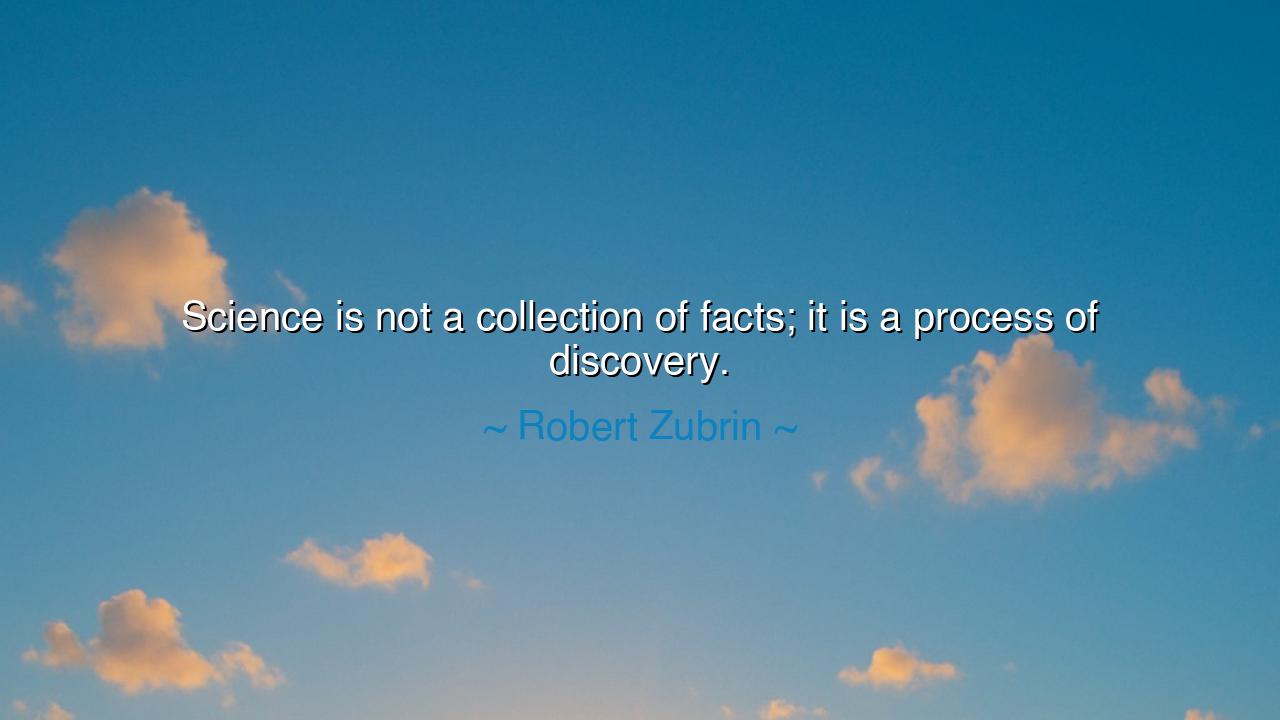
Science is not a collection of facts; it is a process of






“Science is not a collection of facts; it is a process of discovery.” So declares Robert Zubrin, the visionary of space exploration, whose heart beats for the red plains of Mars and the endless frontier. In these words, he lifts the veil from the common illusion that science is a dead archive of numbers and dates, a library of settled truths etched forever in stone. Instead, he reveals it as a living flame, a journey, a restless spirit that seeks not to possess truth once and for all, but to forever pursue it. Science is not the scroll; it is the quest. Not the treasure already found, but the path toward treasures unimagined.
The origin of such a saying comes from Zubrin’s own struggles against the complacency of those who viewed space as a domain too distant, too impractical. He saw that the true heart of exploration lies not in what we already know, but in what we do not yet know. To reduce science to mere facts is to strip it of its vitality, to reduce the soaring eagle to a bird pinned lifeless upon the page. The greatness of science is not that it catalogues the stars, but that it teaches us to wonder what lies beyond the stars, and to build ships that may someday carry us there.
History shines with this lesson. Consider Christopher Columbus, who set sail not with a map of known lands, but with the courage to discover what no map contained. Or think of Galileo, who, turning his telescope to the night, discovered moons orbiting Jupiter—wonders no book of his time could have taught him. The facts came later, written and preserved. But the fire was in the discovery, in daring to look, to question, to risk the scorn of authority. Thus we see: facts are the footprints left behind; discovery is the living journey itself.
Even in medicine, this truth resounds. For centuries, disease was explained by humors and superstition, and the facts recorded in scrolls were thought immutable. Yet Edward Jenner, through observation and courage, discovered the power of vaccination, defeating smallpox and saving countless lives. He did not inherit a fixed set of facts; he reshaped the facts themselves by daring to see anew. The process of discovery is the beating heart, while the facts are only its echoes.
Let us not misunderstand: facts are holy, for they are the harvest of discovery. But to think science ends with them is to mistake the fruit for the tree. The fruit nourishes for a season, but the tree grows ever on, reaching deeper roots and loftier branches. So it is with science: it is the act of questioning, the testing of ideas, the bold crossing into the unknown. Without this spirit, facts grow stale, like bread left too long uneaten. With it, they are continually renewed, refined, and surpassed.
Therefore, O listener, learn this wisdom: do not treat knowledge as a stagnant pool, but as a river that flows ever onward. Do not say, “This is all there is,” but ask, “What lies beyond?” In your studies, in your work, in your daily life, seek not only to memorize, but to explore, to test, to wonder. For the spirit of science is not in the answers we hold, but in the questions we dare to ask.
Practical is the path: read widely, but also experiment; learn facts, but also challenge them; admire the discoveries of others, but never cease to make your own. For as Zubrin has told us, science is not a collection of facts; it is a process of discovery. And to live by this truth is to make your life itself a journey of endless growth, endless wonder, and endless light.






AAdministratorAdministrator
Welcome, honored guests. Please leave a comment, we will respond soon